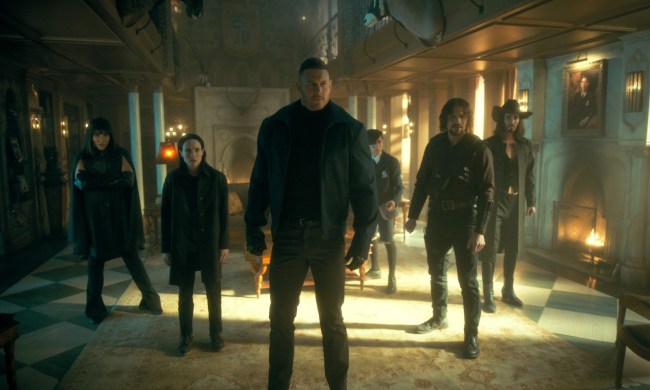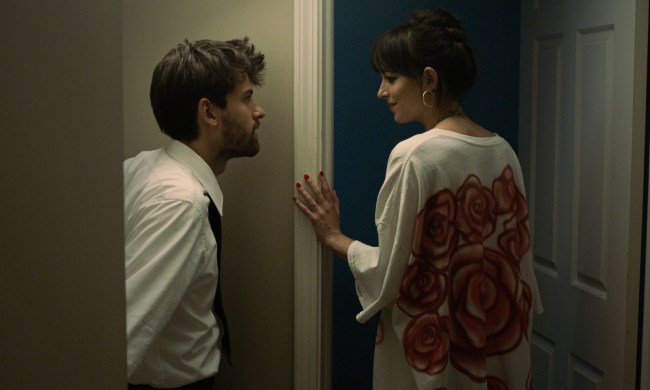Hollywood’s history is peppered with relatable robots capable of bridging the emotional divide between humans and androids. There’s R2-D2 in the Star Wars saga. Johnny 5 in the Short Circuit films. And the romantic trash-bot Wall-E. The Apple TV+ film Finch adds yet another sympathetic automaton to that list, thanks to its android costar, who steals more than a few scenes from one of the industry’s most celebrated actors, Tom Hanks.
If there’s one thing Finch makes clear, it’s that if you’re going to have company for the end of the world, you could do a lot worse than an android named Jeff.

Apocalypse 101
Directed by Miguel Sapochnik (Game of Thrones) from a screenplay penned by Craig Luck and Ivor Powell, Finch casts Hanks as brilliant engineer and inventor Finch Weinberg, who manages to survive a series of cataclysmic cosmic events that turned the planet into a solar-blasted desert of deadly UV radiation and scarce resources.
Now sheltering in a massive underground research center with his dog, Finch leads a solitary, fearful life, avoiding other human survivors and working on projects intended to protect him and his canine pal from the threats posed by the outside world.
Among those projects is an artificially intelligent android equipped with the knowledge of all the encyclopedias, instruction manuals, and guidebooks Finch can find during his foraging missions. Due to prolonged exposure to radiation, Finch has a terminal condition, and he hopes to train the android to care for his dog when his own life ends.
And although the premise might seem a little silly — a man and his android dog-sitter at the end of the world — Hanks, Sapochnik, and actor Caleb Landry Jones (Get Out, Three Billboards Outside Ebbing, Missouri), who provides the motion-capture performance and dialogue for the android, give the story a sense of profound sincerity.

Not a solo story
Although Hanks spends all but a few brief scenes as the only human character on screen, Finch is far from a Cast Away-esque one-man show.
Jeff the android is an endlessly entertaining co-star for Hanks, holding his own against — and occasionally upstaging — the six-time Oscar nominee with moments fun, frightening, and poignant at various points. Sapochnik and the film’s visual effects teams squeeze an impressive amount of subtlety and emotion from Jeff, whose relatively plain “face” wouldn’t normally lend itself to a wide range of expressions.
It’s often uncertain where the actor’s performance ends and the visual effects artists’ work begins. But Jeff is such a fully realized character that both Jones and the visual effects team deserve plenty of praise for the depth they’re able to create in him. From the ever-so-slight shrug of his shoulders when he sighs to the twiddling of his fingers while contemplating a problem, Jeff is a character filled with, well … character.

Hanks-ian heroism
It seems strange to suggest that a two-time Academy Award winner might be the most relatable actor in Hollywood, but nearly every role Hanks has played features the sort of authenticity that turns him into the audience’s surrogate in all of the experiences his characters endure — whether it’s storming Omaha Beach in 1944 in Saving Private Ryan, or struggling to survive on a deserted island in Cast Away.
Finch’s experiences in the postapocalyptic world of the film are no exception, and Hanks’s portrayal of the film’s titular, dog-loving protagonist ranges from calm acceptance of humanity’s dire situation to palpable terror at the prospect of encountering other humans. His character finds serenity in his survival routine, and in giving his dog a good life, and the apocalypse has only amplified his antisocial nature and distrust of other humans.
Hanks is a master of giving quiet movie moments weight, whether it’s the minutia of his life in the underground bunker, his acceptance of his terminal condition, or his paralyzing fear at the prospect of finding other humans in the postapocalyptic wilds. With its limited cast, Finch leans heavily on Hanks and his CG costar, and the award-winning actor offers plenty of reminders that he’s more than capable of carrying his share of the load (and then some).

Simple and satisfying
There’s plenty of symbolism to be found in Finch, but the film is at its best when it simply focuses on its two main characters learning from one another along their journey together.
There’s no great revelation to be had in witnessing their journey, but watching it unfold is plenty rewarding on its own. Finch is upfront about the lessons it wants the audience to take from it and the emotions it wants to evoke, and it finds plenty of success in both areas as Finch and Jeff make their way across the country with the dog they each want to protect.
Like many films that would rather lean into their thematic and emotional cues than the science behind their sci-fi elements, Finch doesn’t work too hard to convince you that Jeff — or the apocalyptic events that changed the world — are based in real-world physics. It opts to let the story of these two characters sweep you along instead, and as long as you don’t dive too deep into the technical and scientific weeds (how Jeff is powered, for example), it’s a thoroughly enjoyable ride.
It’s hard to imagine a film like Finch working with anyone other than Hanks or a robot any different from Jeff, as the pair have wonderful on-screen chemistry and. together, they strike the perfect balance between what we’re shown and what’s better off inferred. There’s much about both of them that we’re left not knowing at the film’s end, but the amount of information we do glean from their time together feels both satisfying and rewarding.
With a fascinating pair of lead characters, a small story that feels bigger than it should, and spectacular visual effects that add texture and warmth to its CG costar, Finch overachieves in all the right ways, and offers another compelling tale about finding light in dark times.
Directed by Miguel Sapochnik, Finch is available now on the Apple TV+ streaming service.





